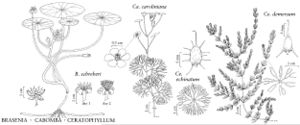Cabombaceae
Herbs, perennial, aquatic, rhizomatous; roots adventitious; air chambers conspicuous in vegetative portions of plant. Rhizomes branched, repent, slender. Leaves arising from erect stems with shortened internodes, submersed and floating; stipules absent. Leaf blade: laticifers commonly present. Submersed leaves (Cabomba only) opposite [whorled], short-petioled; leaf blade palmately dissected. Floating leaves alternate; petiole short to long; leaf blade peltate, linear to broadly elliptic, sometimes with basal sinus (some Cabomba), margins entire. Inflorescences axillary, solitary flowers. Flowers bisexual, protogynous, diurnal, borne at or above water surface (occasionally submersed); peduncle long; involucre absent; perianth persistent in fruit, hypogynous; sepals usually 3, distinct or nearly so; petals usually 3, alternate with sepals; stamens 3–36, rarely more; filaments slender; anthers dehiscing by longitudinal slits, without connective appendage; pistils [1–]2–18, 1-carpellate, inversely club-shaped or swollen on one side; ovary 1-locular; placentation laminar; ovules [1–]2–3[–5]; style short; stigma capitate or linear-decurrent. Fruits achenelike or folliclelike, leathery, indehiscent. Seeds 1–3, aril absent; endosperm sparse; perisperm abundant; embryo minute; cotyledons 2, fleshy.
Distribution
Temperate and tropical.
Discussion
Genera 2, species 6 (2 genera, 2 species in the flora).
Cabombaceae are pollinated by insects (Cabomba) or by wind (Brasenia).
Formerly Cabombaceae often have been included in Nymphaeaceae in the broad sense.
Selected References
Illustrations
Key
| 1 | Plants with opposite, dissected, submersed leaves and (when flowering) with inconspicuous, alternate, linear-elliptic floating leaves 0.6–3 cm; stamens 3–6; submersed parts barely coated with mucilage. | Cabomba |
| 1 | Plants with only alternate, entire, broadly elliptic floating leaves 3.5–13.5 cm; stamens 18–36(–51); submersed parts heavily coated with mucilage. | Brasenia |
